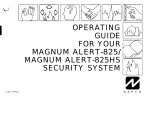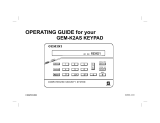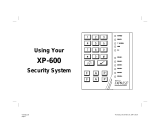Page is loading ...

OPERATING
GUIDE
FOR YOUR
MAGNUM
ALEm-800/800s
SECURITY
SYmM
01955
NAPCO

You have taken a major step
in protecting your home or busi-
ness by having a Napco Magnum
Alert-800/800S Alarm Control
Center installed.
Please read this guide thor-
oughly to familiarize yourself with
your new security system. Keep
this booklet handy for future
reference. Note especially the
ALARM PLAN on page 15. Your
alarm specialist will help you
fiH
it
out and explain the various fea-
tures and operating procedures
for your new Magnum Alert
SOW
800s.

A delay period that allows the system to
be reset before it reports to a
cantml
station.
AlmmPlmn
Identifies the areas of
tected by each zone o
r
our premises pro-
protection and lists
zone features (see page 15).
Anrrkrg/-
Turning yours
tern ON or OFF. This can
be done by en enng a code on the D
r”.
it-
Ke
‘R
keypad, or by turning an optional
sw tch.
Y
ey-
Ann/-1
_lJ
cod.
A code of up to six digits which is used to
arm and disarm the system from the key-
pad.
Standb
Center
‘6,
P
battery is
laced in the Control
x to prov de backup protection in
the event of a power lose.
ConRfal
futkn
Monitors
incomin
burgla and emer-
gency messages rom a D gital
Communi-
8
r
cator,
and alerts the proper authorities
(optional feature).
ConbdC@VBtW
The heart of the
Maanum
Alert-800/800!3
security system; it Gntrols all
system
functions.
ororW-
Reports burglary and emergencies
directty
to the central station over telephone lines.
Napco’s
Digit-Key keypad puts Control
Center functions at
be mounted
either
a
Y
r
fingertipa
It can
the Control Center or
anywhere in your premises.
Lets you exit and enter your premises
without setting off an
alarm
after the
system is armed.
Mb+-
Buzzer at each Digit-Key keypad warns
that entry delay time is In progress. It also
sounds when you attempt to arm the s
tern
if a
,lpa
rticular
zone is in
“troubte”.
It a so
r”
ve
ies contact with a central station
(optional).
PtiBUttWtS
Two buttons
(*
and
#)
on the Dig&Key
keypad
which
will alert the Central Station
of an emergency.
A communication sent to a Central Station
indicating a specific change in condition of
the security system (alarm, trouble, low
battery, etc.). (Optlonai)
ShuneEuuun
Labeled%” on the Digit-Key keypad. Lets
you manually remove one or more pro-
tective zones from the system.
Independent,c~&at
protect specific
areas of
Auto
Zt?
;ftiMopt
unfed Zone: A zone capable
R
~ectionsystemffrtism
~utomatkally
bypassqt
(shunted)
“trouble”
(
the system.
My)
v&en
you attempt to arm
Zone: When a zone selected
for the feature is in “trouble”
tt
will be
impossible to arm the Control Center.
Troubfe
Zones:
Zones that cannot
bs
armed because of an open window, door or
other
ombfem
in the area
24 Hour Zones: Are always armed and
ready at all times to respond to an emer-
gency situation.
3

lndlcator
ughts
-/-n=Y
wm
1-1
l
Steady
-
system is armed.
l
Flashes
-
system is in alarm.
Count the number of flashes to
tell in which zone the alarm
occurred. Example: Fourflashes-
alarm in Zone 4.
smU9Mf-l
l
Steady
-
system is disarmed, all
zones okay.
l
Flashes
-
zone in trouble
(in-
capable of being armed). Count
the number of flashes to deter-
mine zone(s). Example: Four
flashes
-
trouble in Zone 4.
shunt
Ught
(Y8lknw)
l
Steady
-
one or more zones are
shunted (bypassed) from the
system.
MlnCSoundar
l
When you enter your premises,
the tone reminds you to reset
the Control Center before the
end of a timed entry period so
you do not activate the alarm.
The Mini-Sounder also sounds
if you attempt to arm the system
when a particular zone is in
trouble.
r
’
I
IShunt
Ylnl-Soundor
Pmk
Faceplate of Digit-Key keypad
lifts up to reveal convenient ref-
erence index of zones protected.

Each security system is custom tailored to the owner’s needs, but all MAGNUM
ALERTBOO/
800s
have the following:
1.
zones
2.lhdMg~KayKeypad
f.TheAIammOutput
Your system contains up to six
f=Wkay_J
When any zone is activated,
separate zones. Each zone is
an independent circuit that pro-
Lets you perform the following
the
Contr?l
Center
responds
functions: arm/disarm the system;
by
sound’ng
an
aud’ble
alarm
tects specific areas of your home.
check the status (condition) of
and/or alerting a central station
For example: your
afarm
spe-
cialist may have set aside a zone
each zone; temporarily shunt
(re-
(optional). Your alarm specialist
move individual zones from the
has programmed your system
for window protection, exit/entry
system); and send an emergency
to react in a specific manner to
delay, interior space protection,
alert to a Central Station(optional).
each type of emergency. Be sure
safe and valuables protection
you understand how your system
or emergencies. Each zone can
responds to these emergencies.
be “programmed” to react in a
specific manner. Check and be
certain that you know what each
zone protects.

uslrBgyourcdetoaml
addiurmtheqs8mm
If
your system includes the
Once you enter your personal
Napco Digit-Key keypad you can
code into the Napco Digit-Key
choose your own private code
keypad, the red ARMED/MEMORY
to arm and disarm the Control
light will go on to show the Control
Center. To program your code,
Center is armed, and off to show
slide the switch (upper left hand
it is disarmed. If you enter the
corner of your Control Center)
wrong code, your alarm system will
into the LOAD position. Go to the
fail to respond. Be sure to WAIT
Digit-Key keypad and enter any
5 SECONDS before attempting to
combination of numbers up to 6
re-enter your code.
digits (there is no zero). Use a
number you will remember such
as your birthday (12-s-47) rather
Chmg@lyMlrm
than something obvious like your
Slide the switch into the LOAD
address. The
nUmberSYOU
choose
position. Enter
a
new
c&e
into
become the only code
“recog-
the Digit-Key keypad. Return the
nized”
by your system. Return
to the Control Center and slide
switch to the RUN position.*
the switch to the RUN position.*
REMINDER: When arming or
dis-
YOUR
SECURITY
SYSTEM
WILL
respond, you may have entered
arming, if the red light does not
NOT OPERATE IN THE LOAD
the wrong code. Wait 5 seconds
POSITION.
before trying to enter your code
again.
‘When entering your
personal code for the first time, or reentering your code
after an extensive power failure, enter the code again
after moving the switch to
6
the RUN position. This will activate the keypad lights and arm the system.

First, check the green
STATUS light at the keypad or
keyswitch. If this light is on stead-
ily, enter your code. The red
ARMED/MEMORY light will come
on and the green lamp will go out.
Leave immediately through the
entry/exit doorway before the
delay time runs out. If you delay
too long in leaving the premises,
you will hear the Mini-Sounder
warn you that the exit delay time
has run out. To avoid causing an
alarm, quickly return to the keypad
and enter your code to reset the
Control Center. You may then re-
arm and try to exit again.
kmlngwltha-
In
“trouble”
When the green STATUS light
is flashing, one or more of your
burglary protection zones are in
“trouble” and incapable of being
armed. The green light will flash
the number(s) identifying the
zone or zones in “trouble”. For
example, if your back door is open
on Zone 1 and a window is open on
Zone 3, the green STATUS lamp
will flash once for Zone
1,
pause,
then flash three times for Zone 3.
(Refer to your Alarm Plan for zone
locations.)
Look for something you can
fix yourself in the area protected
by the zone(s) in “trouble”. In this
example, you can fix the zones
yourself by closing the back door
and the window.
If the zone cannot be fixed
immediately, the green light will
continue to flash. Try to arm. If
the zone(s) in “trouble” have
been programmed as
Auto-
Shunt zones, the red ARMED/
MEMORY lamp will come on,
the green light will go out, and
your system will be armed. The
sounder will come on for 4
sec-
onds to remind you that you
armed with one or more zones
shunted (turned off).
When you try to arm with a
zone programmed as a Priority
Zone in “trouble”, the Control
Center will not arm. Enter your
code again to silence the
sounder. If you cannot fix the
zone, call your alarm specialist.
Check the Alarm Plan in this
manual to remind you which
zones are programmed as Prior-
ity zones and which are
Auto-
Shunt.
The Alarm Plan will also indi-
cate which zones, if any,
csn
be
manually shunted. Manually
shunt with caution. Shunting too
many zones will leave your prem-
ises unprotected, even with
your system armed. To arm with
zone(s) manually shunted, count
the flashes on the green STATUS
light to be sure the zone in
“trouble” is capable of being
manually shunted. Press the
7

SHUNT button, labeled “S”, and
enter your code. The yellow
SHUNT light and the
red
ARMED/
MEMORY light will come on. The
green light will be out. All zones
programmed by your alarm spe-
cialist to respond to manual
shunting will be shunted (even if
some are not in “trouble”).
Leave quickly when the red
ARMED/MEMORY light goes on.
Be sure to have all zones in
“trouble” repaired as soon as
possible.
DlSWfBllng
when
you
return
When you enter through the
exit/entry door, the entry delay
Mini-Sounder will come on.
Check the red ARMED/
MEMORY light. If it is flashing,
an alarm occurred while you were
gone. Disarm the system with
your code from the keypad to
silence the sounder. NOTE: If
your system has a digital com-
municator, there may be a delay
while it is reporting an alarm
before your system disarms.
If the red ARMED/MEMORY
light was flashing before you
disarmed, it will go out briefly
then begin to flash a number of
pulses identifying the zone(s)
that had an alarm. Write down
the number of times the alarm
memory lamp flashes, so you will
have a record of which zone(s)
need attention. You may then
arm and disarm to cancel the
flashing alarm memory. If a zone
is still in alarm condition, you
will hear the Mini-Sounder for
three seconds. The red ARMED/
MEMORY light will go out. The
green STATUS light may start
flashing if zones are still in
“trouble” from the alarm.
If there was an alarm and the
red ARMED/MEMORY light did
not flash, the alarm was a 24 hour
zone (see your Alarm Plan). The
cause of the alarm will have to be
removed before you can clear
the alarm signal.
a

Arming
with
zone
shunting
You might have chosen one
or two zones that you can man-
ually “shunt out” of the system
from the keypad. A shunted
(bypassed) zone cannot cause
an alarm. Zone shunting may be
used for turning off interior
protection, or allowing you to
turn on only your perimeter
protection.
To arm with zone(s) shunted,
first check the green STATUS
lamp to make sure that no peri-
meter zone is in “trouble”. Then
press the SHUNT button, labeled
“S”,
and enter your code. The
yellow SHUNT light and the red
ARMED/MEMORY light will come
on. The green light will be out.
The SHUNT light will go out when
you disarm the Control Center.
Alrmlwhhthe
systam
dlsarmed
If an alarm signals at a time
when your system is not armed,
an alarm is occurring on a 24
hour protection zone, or your
standby battery is low. The cause
of the alarm must be corrected
and then the Control Center reset
by arming and disarming again in
order to clear the signal. (Consult
your Alarm Plan to determine
which, if any, of your protection
zones are 24 hour.)
hlstant
protection
Your alarm specialist may have
installed an optional switch that
may be used to cancel the exit/
entry delay period at the time of
arming the system. Use this fea-
ture when at home to sound an
instant alarm upon intrusion
through the exit/entry door.
Activate the switch prior to arm-
ing. Be sure to restore the switch
to the normal position, disarm
the system, and then re-arm the
system if you are leaving the
premises.
9

Panic alarm
To activate a panic alarm and
call for outside help, press the
two buttons marked l and
#
on
the Digit-Key keypad.
Makesure
you press both buttons at the
s8me
time. The panic zone is
capable of sending
asilent
signal
to the Central Station when a
Digital Communicator is being
used (optional).
The
Penic
Ai8rm is
always
active, whether your system is
armed or not.
10

Your Alarm Specialist may
have programmed your security
system to be monitored by a
Central Station. The built-in
digital communicator can trans-
mit emergency signals to the
Centml Station 24 hours a day.

AbortDeby
Note which zones on your
Cantfal
Madon
alarm plan have abort delay. This
mribwk
is a 16 second delay that enables
The Central Station will
ac-
An optional feature that
per-
you to reset the system before a
knowledge the fact that you have
mits the Central Station to receive
zone condition report is sent to
armed your system by “ringing
a signal each time the system
the Central Station. Non-24 hour
back” with a short beep of the
is armed, disarmed or both.
zones, however, must first be
Mini-Sounder.
repaired.
12

The following information is
applicable only where local
ordinance permits use of your alarm
Control Center for fire detection
Controrlklg
Your
Fin
Circuit
If your alarm specialist installed
smoke detectors or heat sensing
thermostats, you have 24 hour fire
protection. This optional Fire Pro-
tection Zone is always active, even
though your system may be dis-
armed. An optional Fire Supervision
and Indicator Station on the Control
Center provides the following fire
circuit controls.
ACFOWWCtWCk
If the yellow AC light on the Fire
Supervision and Indicator Station is
off, the Control Center is not receiv-
ing AC power. Press the spring-
loaded SILENCE
8.
FIRE RESET
switch toshut off the Mini-Sounder.
Check lights to see if there is a
general power outage. If there is,
you will be operating from your
standby battery. When AC power is
restored, the Mini-Sounder will
come back on. Press the spring-
loaded switch again to silence the
Mini-Sounder.
Fire-zone
check
The Mini-Sounder on the Fire
Supervision and Indicator Station
signals a problem on the Fire Zone.
Press the spring-loaded SILENCE
8 FIRE
RESETswitch
toshutoff the
Mini-Sounder. The red TROUBLE
light will come on until the Fire
Zone is cleared. When the zone is
restored, the Mini-Sounder will
signal again to indicate that the
Fire Zone is functional. Press the
SILENCE 8 FIRE RESET switch
once again to turn off the
Mini-
Sounder.
Fire--Reset
After a fire alarm, the red FIRE
ALARM light will be on. Press the
SILENCE 8 FIRE RESET switch to
clear the smoke detectors.
Alann/BaRtefyTese
The fire alarm bell/siren and
standby battery should be tested
weekly. Disarm the Control Center.
Push the BATTERY
a
BELL TEST
switch down and listen to the bell/
siren. If the alarm sounds weak,
the battery is faulty. Call for service.
Would You
Uke
More
sawylnformatlon?
For information on home fire de-
tection, burn safety, and home fire
safety, contact the National Fire
Protection Association, Public
Affairs Dept.O5A, Battetymarch
Plaza,
Quincy,
MA 02269.
NOTE: If there is no Fire Supervision and Indicator Station on your Control
Center and your Fire Zone uses smoke detectors, have your alarm specialist
show you and explain the switch he has installed for resetting the smoke
detectors after an alarm.
13

an escape plan
Even with the most advanced
fire alarm system, adequate pro-
tection requires an escape plan.
To prepare your plan:
Draw floorplans of your build-
ing (see sample). Show two
exits: a front or back door and
a window from each room. (Make
sure the window works. You may
need a special fire escape ladder
if the window is high up.) Write
cipaw,~
your outside meeting
Rehearse: (1) Everyone in
their room with the doors closed.
(2) One person sounds the alarm.
(3) Each person tests his door.
(4) Pretend the door is hot and
use the alternate escape exit.
(5) Everyone meet outdoors at
the assigned spot.
lMFoRTANTl
-
Discuss these escape procedures
with those who use the building.
(1) If the premises is a residence,
sleep with the bedroom door closed.
A closed door will hold back deadly
smoke while you escape.
(2) When the fire alarm signals, escape
quickly. Do not stop to pack
(3) Test the door. If it is hot, use your
alternate route through the window.
If the door is cool, brace your shoulder
against it and open it cautiously. Be
Read
Carefkally
ready to slam the door if smoke or
heat rush in. Crawl through smoke,
holding your breath. Close the doors
again on leaving to help prevent the
‘fire from spreading.
(4) Go to your specific outdoor meeting
~2
so you can see that everyone IS
(5) Assign someone to make sure
nobody returns to the burning building.
(6)
Call the fire department from a
neighbors telephone.
14

Zone
Area
Protected Zone Features
Contacts
(doors, windows, etc.)
1
3
I
4
I
Aux.
(6)
Central Station?
Service Person
‘optlonal
katun,
Telephone#
,
Telephone#
15

NAPCOLlMiTEDWARRANly
/












